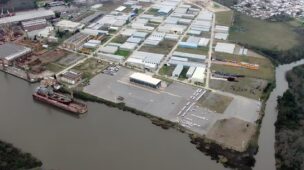Tempo de leitura: 4 minutos
| Martín Gustavo Ibarra | Free zones have long been an under-tapped opportunity to boost investment in tourism. With capital flows into the industry yet to bounce back to pre-pandemic levels, the need for free zones focusing on tourism is now greater than ever.
This year marks a new push to bring this vision closer to reality. UN Tourism and the World Free Zones Organization recently formed an alliance to collaborate in the promotion of tourism economic free zones worldwide. Until now, free zone regimes have mostly benefited manufacturing and logistic projects. But there’s no reason why they can’t allow tourism industries to also thrive.
What are tourism economic free zones?
Tourism economic free zones are designated areas or projects, such as hotels, that benefit from fiscal and regulatory incentives aimed at attracting foreign direct investment. They can also encompass services and supply chains that strengthen the broader tourism ecosystem. This concept isn’t merely an idea but a proven reality. Several countries have already joined the wave.
Indonesia is a leading example. It has more than ten special economic zones tailored to tourism, including two on the popular island of Bali: the Sanur Health and Wellness Tourism SEZ and the Kura Kura SEZ.
Examples from other regions show the model’s versatility. In Honduras, Zolitur demonstrates a model focused on environmental protection and conservation-driven tourism, while Tanzania’s KiSEZ promotes not only cultural and nature-based tourism, including wildlife experiences, but also supports manufacturing and agribusiness activities. Other tourism-focused free zones hosting established hotel developments include the Waigaoqiao Free Trade Zone Hotel in China, Entertainment City in the Philippines, which hosts the Okada Resorts, and the Four Seasons Hotel in Cartagena, Colombia.
Multiple benefits
As these countries know, free zone regimes can bring many benefits for tourism enterprises, investors and their surrounding communities. Fiscal benefits can include VAT and tariff exemptions when importing hotel furnishings, equipment and construction materials. Reductions or exemptions from income tax — and even local and municipal taxes — may also apply.
By leveraging these incentives it is possible to reduce the cost of investment and operations, while increasing profitability. Based on experience and observations, these exemptions can lead to an estimated cost reduction of up to 30 per cent.
Yet non-fiscal benefits are just as important. Tourism economic free zones can bring together a range of companies within multi-enterprise zones, creating synergies across tourism-related activities. This clustering fosters improved logistics, supply chains and co-ordination between service and goods providers within the industry. As a result, it not only strengthens tourism value chains but also enhances the sector’s competitiveness.
There are positive spillovers for the surrounding area, too. Minimum local employment thresholds for foreign companies can ensure that a significant share of job opportunities is directed towards local communities, which is especially powerful given that tourism is a major driver of youth employment. They can also promote community-based and cultural tourism initiatives, and encourage sourcing from local small and medium-sized enterprises across industries such as agriculture, handicrafts, transport and hospitality.
Entering the market
There are different ways to establish tourism economic free zones. Hotels are eligible to be built in several of the 7000-plus free zones operating in more than 140 countries today.
In some countries, tourism projects can also claim qualification as a standalone free zone by presenting a new greenfield project that impacts one or more areas of tourism development such as supporting infrastructure, convention centres, amusement parks and golf courses.
For countries looking to introduce or amend legislation to enable tourism economic free zones, UN Tourism and the WFZO are supporting governments, free zone authorities and other stakeholders involved in navigating this process. While the path may vary depending on each country’s legal framework, infrastructure, and the role tourism plays in the national economy, many are well positioned to take advantage of this model.
Our alliance is committed to making tourism economic free zones a more widely used instrument for inclusive and sustainable growth across the global tourism industry. With collaboration and foresight, tourism economic free zones will by a milestone in the promotion of industry’s mega projects of the future.
Martín Gustavo Ibarra is a founding member of the World Free Zones Organization and CEO of Araújo Ibarra International Business Consultants.
Fonte: FDI Intelligence | Foto:Reprodução






Os comentários foram encerrados, mas trackbacks e pingbacks estão abertos.